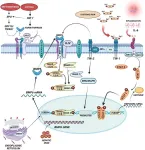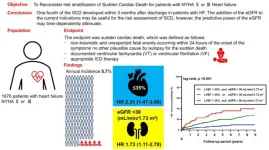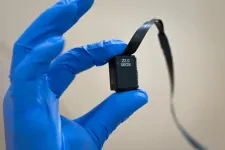(Press-News.org) NCSA Director Bill Gropp and two former Center directors were chosen for the first-ever HPCwire “35 Legends” list in celebration of the publication’s 35th anniversary.
Thirty-five honorees will be announced each year, selected by HPCwire editors and advisors based on their contributions to the high-performance computing community over the past 35 years and celebrated for the different ways they’ve helped move HPC forward.
Gropp, NCSA’s Founding Director Larry Smarr and Former Director Daniel Reed were among the first 17 honorees announced in July. The remaining HPCwire 35 Legends will be made public in August.
HPCwire highlighted Gropp’s leadership as director at NCSA in his 35 Legends profile, saying he “has driven significant growth in its programs and infrastructure,” including providing essential GPU cycles for the U.S. National Science Foundation (NSF) program ACCESS. Gropp is also a professor of Computer Science in the Grainger College of Engineering at the University of Illinois Urbana-Champaign and holds the Grainger Distinguished Chair in Engineering. Additionally, he is the principal investigator for the NSF-funded Delta and DeltaAI systems.
“Two of Gropp’s most significant contributions to HPC are the PETSc parallel numerical library and the MPI standard. His contributions played a crucial role in developing the MPI standard, and he started and led the creation of the MPICH implementation of MPI, both of which remain widely used today.”
NCSA’s history of leadership in advanced computing is a shining example of the growth that’s occurred in the HPC field itself.
“Computing gives you a tool to answer questions that can’t be answered in any other way, and I find this exciting,” Gropp told HPCwire. “HPC, of course, gives you the most powerful tools to answer the hardest problems.”
In Smarr’s profile, HPCwire dubbed him “a pioneer in scientific computing, supercomputer applications and internet infrastructure,” highlighting the NCSA founding director’s many contributions to the HPC field, including “a move that revolutionized the field of HPC itself” when he co-submitted a 10-page proposal to the NSF in 1983 titled “Center for Scientific and Engineering Supercomputing” – informally known as the “Black Proposal” after the color of its cover – which was the first unsolicited submission to be approved by the NSF and led to the founding of four supercomputing centers at Cornell, Illinois, Princeton and San Diego, with a fifth established later at Pittsburgh.
mong his many accomplishments, Reed played a pivotal role as a principal investigator and chief architect for the NSF TeraGrid scientific computing infrastructure, which later evolved into NSF XSEDE and ACCESS, programs that NCSA has continued to help steer.
“Compiling this list has been a personal ride down memory lane,” said Tom Tabor, founder and CEO of Tabor Communications Inc., publishers of HPCwire. “Being at the helm of HPC’s leading news outlet for the last 35 years has been one of the most exciting and rewarding parts of my life – period. I’ve really savored the opportunity to be in the room with some of the most brilliant people in our industry, all of whom are wholeheartedly committed to improving the quality of life on our planet. Being part of these discussions has been extremely stimulating and fulfilling.”
Check out the HPCwire announcement for more on the initial 35 Legends list.
END
Gropp, former NCSA leaders selected for HPCwire’s inaugural ‘35 Legends’ list
2024-07-29
ELSE PRESS RELEASES FROM THIS DATE:
The sooner the better: teaching healthy habits in elementary school reduces abdominal fat
2024-07-29
A study led by the Centro Nacional de Investigaciones Cardiovasculares (CNIC) and Fundación SHE, supported by “la Caixa” Foundation, demonstrates that teaching healthy habits through classroom activities helps to prevent the accumulation of abdominal fat during the first school years.
The study, published in the Journal of the American College of Cardiology (JACC), is one of the largest contemporary school-based health promotion studies and has one of the most extensive participant follow-up schedules.
The conclusions are clear: early intervention to promote healthy habits in elementary school children can be more ...
Exploring the impact of iron overload on mitochondrial DNA in β-thalassemia
2024-07-29
β-Thalassemia is a genetic disorder characterized by reduced or absent synthesis of the beta chains of hemoglobin, leading to ineffective erythropoiesis and severe anemia. Patients with transfusion-dependent β-thalassemia (TDT) require regular blood transfusions to maintain adequate hemoglobin levels. Non-transfusion-dependent thalassemia (NTDT) patients manage their anemia without regular transfusions but still experience significant health complications. Iron overload is a common and severe complication in both TDT and NTDT patients ...
Fatty acids in umbilical cord blood might cause autism spectrum disorder
2024-07-29
Autism spectrum disorder (ASD) is a neurodevelopmental disorder that affects learning capability and social behavior of people. Over the past few decades, awareness regarding ASD has increased, especially regarding its prevalence and effect on the lives of people diagnosed with ASD. However, several aspects related to ASD are not well understood, leaving much to be explored.
Although the exact causes of ASD are unclear, currently available evidence points to neuroinflammation as a major factor. Several studies in mouse models of ASD have hinted at the importance of polyunsaturated ...
Kidney dysfunction may predict sudden cardiac death in patients with heart failure
2024-07-29
Patients with congestive heart failure (CHF) having a compromised blood supply, are at greater risk of sudden cardiac death (SCD). With an estimated incidence as high as 22% among these patients, current clinical guidelines recommend using implantable cardioverter defibrillators (ICDs) to help mitigate the risk of SCD.
Although the application of ICDs in patients with CHF is backed by substantial evidence, these studies did not include people with chronic kidney disease (CKD), who are an important clinical population. In other ...
Virus that causes COVID-19 is widespread in wildlife, Virginia Tech scientists find
2024-07-29
SARS-CoV-2, the virus responsible for COVID-19, is widespread among wildlife species, according to Virginia Tech research published Monday (July 29, 2024) in Nature Communications. The virus was detected in six common backyard species, and antibodies indicating prior exposure to the virus were found in five species, with rates of exposure ranging from 40 to 60 percent depending on the species.
Genetic tracking in wild animals confirmed both the presence of SARS-CoV-2 and the existence of unique viral mutations with lineages closely matching variants circulating in humans at the time, further supporting human-to-animal transmission, the study found.
The highest exposure to SARS ...
Study tracks exposure to air pollution through the day
2024-07-29
There are significant differences in how much people are exposed to air pollution, according to a new study co-authored by MIT scholars that takes daily mobility into account.
The study, based in the Bronx, New York, does not just estimate air pollution exposure based on where people live or work, but uses mobile data to examine where people go during a typical day, building a more thorough assessment of the environment’s impact on them.
The research finds exposure to particulate matter 2.5 microns or bigger rises by about 2.4 percent when daily travel patterns are taken into account.
“One of the main strengths of the study is that we ...
UC San Diego researchers use non-invasive technique to record involuntary nervous system
2024-07-29
A research team led by UC San Diego has, for the first time, shown that a wearable, non-invasive device can measure activity in human cervical nerves in clinical settings.
The device records what the team calls Autonomic Neurography (ANG), neural activity from the human vagus and carotid sinus nerves as well as other autonomic nerves found in the skin and muscle of the neck. The vagus nerve is a “superhighway” of the involuntary nervous system, with tendrils extending from the base of the skull through the torso and abdomen to influence digestion, heart rate and the immune system. The vagus nerve ...
Most US voters agree on basic human values – so is polarization exaggerated?
2024-07-29
The vast majority of American voters think alike on what they find important in life, but both Republicans and Democrats fail to recognise their shared views and values, according to new research from the Universities of Bath and Essex.
This finding is revealed today in the academic journal Social Psychological and Personality Science less than a month after the US Republican presidential nominee Donald Trump survived an assassination attempt when a gunman shot at him during a campaign rally.
“There’s a general perception ...
Optical fibers fit for the age of quantum computing
2024-07-29
A new generation of specialty optical fibres has been developed by physicists at the University of Bath in the UK to cope with the challenges of data transfer expected to arise in the future age of quantum computing.
Quantum technologies promise to provide unparalleled computational power, allowing us to solve complex logical problems, develop new medicines and provide unbreakable cryptographic techniques for secure communications. However, the cable networks used today to transmit information across the globe are likely to be sub-optimal for quantum communications, due to the solid cores of their optical fibres.
Unlike regular optical ...
Do non-statin cholesterol-lowering drugs affect liver cancer risk?
2024-07-29
Past studies have suggested that taking cholesterol-lowering statin drugs may lower individuals’ risk of developing liver cancer. In a new study of non-statin cholesterol-lowering medications, one type was linked to lower risks of liver cancer. The findings are published by Wiley online in CANCER, a peer-reviewed journal of the American Cancer Society.
Cholesterol absorption inhibitors, bile acid sequestrants, fibrates, niacin, and omega-3 fatty acids are types of non-statin cholesterol-lowering medications prescribed to manage cholesterol and lipid levels. The different classes ...






